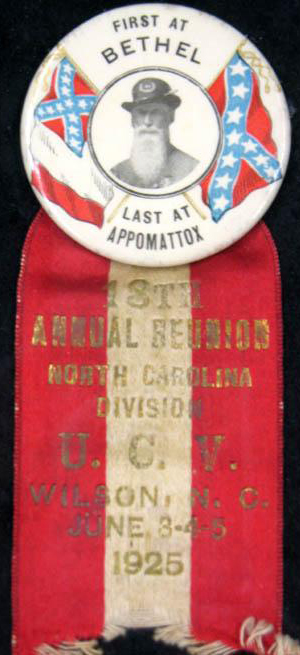"First at Bethel, Farthest to the Front at Gettysburg and Chickamauga, and Last at Appomattox"
 "First at Bethel, Farthest to the Front at Gettysburg and Chickamauga, and Last at Appomattox" is a traditional saying honoring the role of North Carolina's soldiers in the Civil War. Editor Walter Clark, later chief justice of the Supreme Court of North Carolina, encouraged its use as early as 1901. The initial three words, "First at Bethel," hold a double meaning. The First Regiment of North Carolina Volunteers was instrumental in winning a Confederate victory at Bethel, Va., on 10 June 1861, the first land battle of the war; this engagement took the life of Tarboro resident Henry Lawson Wyatt, the first Confederate soldier to die in action.
"First at Bethel, Farthest to the Front at Gettysburg and Chickamauga, and Last at Appomattox" is a traditional saying honoring the role of North Carolina's soldiers in the Civil War. Editor Walter Clark, later chief justice of the Supreme Court of North Carolina, encouraged its use as early as 1901. The initial three words, "First at Bethel," hold a double meaning. The First Regiment of North Carolina Volunteers was instrumental in winning a Confederate victory at Bethel, Va., on 10 June 1861, the first land battle of the war; this engagement took the life of Tarboro resident Henry Lawson Wyatt, the first Confederate soldier to die in action.
During the Battle of Gettysburg, North Carolina infantrymen advanced the greatest distance against withering Union gunfire on 3 July 1863 in an attack commonly known as Pickett's Charge. Some credit the 58th North Carolina Regiment with the deepest penetration of enemy lines on Snodgrass Hill at Chickamauga on 20 Sept. 1863, although at least one historian contends that battle conditions made the claim impossible to substantiate. Finally, the men of Company D, 30th North Carolina Regiment, fired the last shots on federal forces at Appomattox on 9 Apr. 1865, the day Gen. Robert E. Lee surrendered his Army of Northern Virginia to Union general Ulysses S. Grant.
References:
Hugh T. Lefler and Albert R. Newsome, North Carolina: The History of a Southern State (1973).
Greg Mast, State Troops and Volunteers: A Photographic Record of North Carolina's Civil War Soldiers (1995).
Additional Resources:
Committee. "North Carolina in the War Between the States." State Literary and Historical Association, Literary and historical activities in North Carolina, 1900-1905, Vol. 1. Raleigh [N.C.] : E. M. Uzzell. 1907. p. 416-490. https://digital.ncdcr.gov/Documents/Detail/literary-and-historical-activities-in-north-carolina-1900-1905-vol.-1/2148987?item=2235437 (accessed September 24, 2012).
North Carolina Literary and Historical Association. Five points in the record of North Carolina in the great War of 1861-5: report of the Committee. Goldsboro, N.C.: Nash Brothers. 1904. https://digital.ncdcr.gov/Documents/Detail/five-points-in-the-record-of-north-carolina-in-the-great-war-of-1861-5-report-of-the-committee/2218397?item=2218466 (accessed September 24, 2012).
Image Credits:
"Badge, Accession #: H.2011.129.1" 1925. North Carolina Museum of History.
1 January 2006 | Poff, Jan-Michael